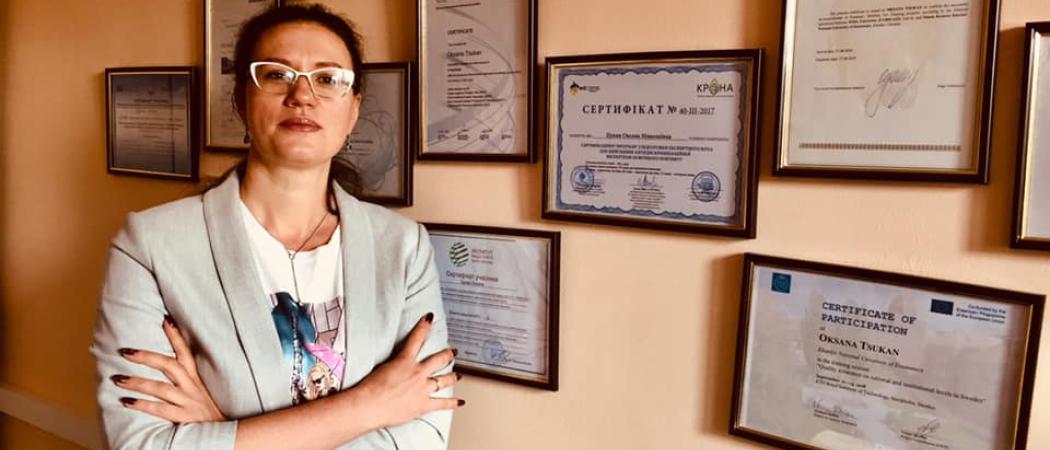Joining EU projects enables Ukrainians to continue their work and to visit family members abroad, says researcher Oksana Tsukan

Oksana Tsukan knows more than most about the benefits of international research collaboration. She has participated in more than 30 international projects over the years, building relationships that would eventually allow her to move her daughter out of Ukraine following Russia’s invasion.
Tsukan, a researcher from Kharkiv National University of Internal Affairs focusing on gender equality in the police, moved to France in February 2023 after the University of Lille, her partner in one of those projects, contacted her looking for a replacement professor. “My daughter has epilepsy, and during the war it was stressful for her. The doctor said, if you want to help your child, please get out of our country,” she told BioWorld.
Since the war started, there has been growing interest among Ukrainian researchers in joining EU projects, partly as a way to earn additional money, as salaries in Ukraine are low.
Remuneration for many academics is linked to key performance indicators, which can include participation in international projects, while an upcoming national law change is expected to allocate additional funding to universities that win international grants.
Male researchers have an additional incentive if their families fled the country. Working-age men are restricted from leaving Ukraine, but researchers are often permitted to make short-term trips abroad because the authorities are eager to maintain research networks and collaborations.
“A lot of men want to participate in my projects because it’s a real possibility to see their child,” Tsukan said. “It’s normal to cross the border for one week just to participate in project meetings.”
A study by Swiss and Ukrainian researchers estimated that 18.5% of the country’s scientists had left Ukraine by the end of 2022. While this is similar to the figure for the general population at the time, the emigrating scientists were among the most active researchers in Ukraine. Three quarters of the scientists who fled the country were female.
In Kharkiv, Tsukan was responsible for finding consortium partners and supporting international cooperation. When she took on this role in 2015 collaboration was non-existent. “Nobody believed it was possible. They thought it’s not for us, we’re not real scientists, and if the university receives money we will not see it,” she said.
Today, the university is involved in several Horizon and Erasmus+ capacity building projects and is helping to show others in the country what can be done. “If one university can do it, of course another university from the defence and security sector can do the same,” she said. “It’s a story about believing in ourselves.”
Horizon Europe Office
Tsukan joined representatives of the new Horizon Europe Office in Ukraine on a recent study visit to Brussels where they met with several departments in the European Commission. After Ukraine was associated to Horizon Europe in June 2022, the Commission opened the office in Kyiv to promote EU funding opportunities and support researchers and innovators.
She says she is very happy to have a dedicated office in Ukraine. “It’s an official body that can spread official information, and we can receive faster information from Brussels,” she said.
Before the office launched, the biggest challenge for researchers was accessing information, Tsukan said. She would point colleagues towards the funding and tenders portal, but if it was their first time using it, they wouldn’t know where to start.
Now Tsukan would like to see the Horizon Europe office organise networking meetings with potential consortium partners, “to show to European communities that we are normal, we respect deadlines, we know all the rules, and we have good scientists”.
While settling in her new country hasn’t always been easy – Tsukan was surprised to find that many of her new colleagues did not speak English and so set about learning French - she is grateful for the support she has been offered by France, and by the partners in her four Horizon 2020 and Horizon Europe projects.
“When this terrible situation started, I received a letter from each partner with some suggestions: please come to us, we can organise you a salary, or you can continue with this project on our budget. It’s really motivating to continue,” she said.
Tsukan hopes eventually to return to Ukraine, and in the meantime, continues to teach remote classes at her home university, like many of her colleagues.
“Today, about 30% of Ukrainian scientists are forced to work remotely,” says Igor Taranov, head of the Horizon Europe Office in Ukraine. This includes emigrants and internally displaced people who have been forced to leave areas, including Kharkiv, Kyiv and Odesa, which have been most affected by bombing. More than 45% of research infrastructure has been damaged or destroyed since the start of the war.
Various support schemes for Ukrainian academics have been set up in Europe and further afield since the Russian invasion in February 2022, including EU initiatives such as ERA4Ukraine and MSCA4Ukraine. Last month the Alliance of German Science Organisations laid out plans to help transform this emergency assistance into long-term support.





 A unique international forum for public research organisations and companies to connect their external engagement with strategic interests around their R&D system.
A unique international forum for public research organisations and companies to connect their external engagement with strategic interests around their R&D system.